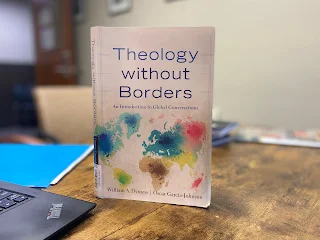Book Review: Theology without Borders by William A. Dyrness and Oscar García-Johnson
This is a book review of Theology without Borders, a 2015 book released through Baker Academic. In Theology without Borders, Authors William A. Dyrness and Oscar García-Johnson introduce readers to the need for global theological conversations, and they introduce readers to some of the conversations that are happening and still need to happen. The authors do a good job at giving us the reasons and implications for a larger global theological approach.
Throughout Theology without Borders, William A. Dyrness and Oscar García-Johnson grapple with the challenges of doing theology in a post- or non-Western globalized context. The authors argue that Western Christianity faces the tensions of pluralism, globalization, and territorialism, and must thus recognize the need for a global theology enterprise is evident. In fact, the authors point out that “we cannot properly be called global theologians if what we do is investigate and represent others in our scholarship while neglecting their self-representing paradigms. This would degenerate our theology into egology (speaking of the self). Let us make no mistake on this point – every theology carries within it a geopolitical, historical, and ideological prerogative and commitment that makes it contextual, whether it is acknowledged or not.”[1] Throughout this book, I wondered what it might look like if our conversations in theology and church missiology would be better represented by having more diversity and voices at the table.
To accomplish this, theologians must acknowledge and study the theological self-representation that comes through our unconsciously informed colonial theological categories. Moreover, Dyrness and Garcia-Johnson advocate that Western theologians must work collaboratively, interdisciplinarily, and interlocally, and utilize different hermeneutical windows from those historically and normatively used in the West. In their own words, “...the task of elaborating theology collaboratively, interdisciplinarily, and interlocally entails an act of self-interpretation and self-representation in the form of a discourse that acknowledges its own context as it pursues a constructive dialogue with the contextual other.”[2] Global theology, “must represent a dialogical and culturally developmental discipline.”[3]
I relate to the confession of William A. Dyrness, who admits openly that “the Christianity I knew was dominated by Western voices. This was not because I or anyone I studied with assumed they were superior but because that was all we knew. As far as I knew, for most of Christian history, theology had been centered and developed in the West, and there was no other way of doing theology. But my experiences outside the West soon alerted me to the fact that there was something missing in this traditional account of theology.”[4] In this increasingly diverse, globalized and integrating world our approach and posture must emerge with something new. In that new thing, we must realize and confess that we have too little “awareness of the theological implications of” our western paradigms, and as a result, “imbalances that have resulted.”[5]
This book is not attacking, undermining or undervaluing western input into theology. Rather, the authors are not asking or “proposing that non-Western theologians ignore the Western tradition of theology; that would be both impossible and unwise”[6] Rather, “part of the challenge faced by non-Western theologians has been the damage caused by colonial patterns, both political and economic, and the resulting dependency, both economic and epistemological.”[7] For this reason, the authors are challenging that our theological and cultural awareness must grow, it must be held in tension with others, and we must be aware of our “locus theologicus, which refers literally to the place from which, or in terms of which, theology is formed.”[8]
Dr. William Dyrness is a dean emeritus and professor of theology and culture at Fuller Theological Seminary, and graduated from the University of Strasbourg and Free University. Author Oscar García-Johnson, holds a PhD from Fuller Theological Seminary, and has served as the associate dean of the Center for the Study of Hispanic Church and Community at Fuller Theological Seminary. Both authors are well informed, and easy to understand.
I recommend Theology without Borders, but I will warn that this is the sort of book that you will want to agree with and disagree with the authors and their points, as you read through it. This read is not without mental Olympics and wrestling with several concepts, reflections and thesis statements that are boldly stated. There are many times you will want to sit down with the author and hear some further ideas and thoughts behind some of their statements. Yet, I doubt there is a clearer argument for a theological dialogue with the contextual other.
[1] William A. Dyrness and Oscar García-Johnson, Theology Without Borders (Grand Rapids, MI: Baker Academic, 2015), 6-7.
[2] William A. Dyrness and Oscar García-Johnson, Theology Without Borders (Grand Rapids, MI: Baker Academic, 2015), 9.
[3] William A. Dyrness and Oscar García-Johnson, Theology Without Borders (Grand Rapids, MI: Baker Academic, 2015), 22.
[4] William A. Dyrness and Oscar García-Johnson, Theology Without Borders (Grand Rapids, MI: Baker Academic, 2015), 27.
[5] William A. Dyrness and Oscar García-Johnson, Theology Without Borders (Grand Rapids, MI: Baker Academic, 2015), 31.
[6] William A. Dyrness and Oscar García-Johnson, Theology Without Borders (Grand Rapids, MI: Baker Academic, 2015), 33.
[7] William A. Dyrness and Oscar García-Johnson, Theology Without Borders (Grand Rapids, MI: Baker Academic, 2015), 33.
[8] William A. Dyrness and Oscar García-Johnson, Theology Without Borders (Grand Rapids, MI: Baker Academic, 2015), 32.

.jpeg)

